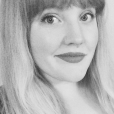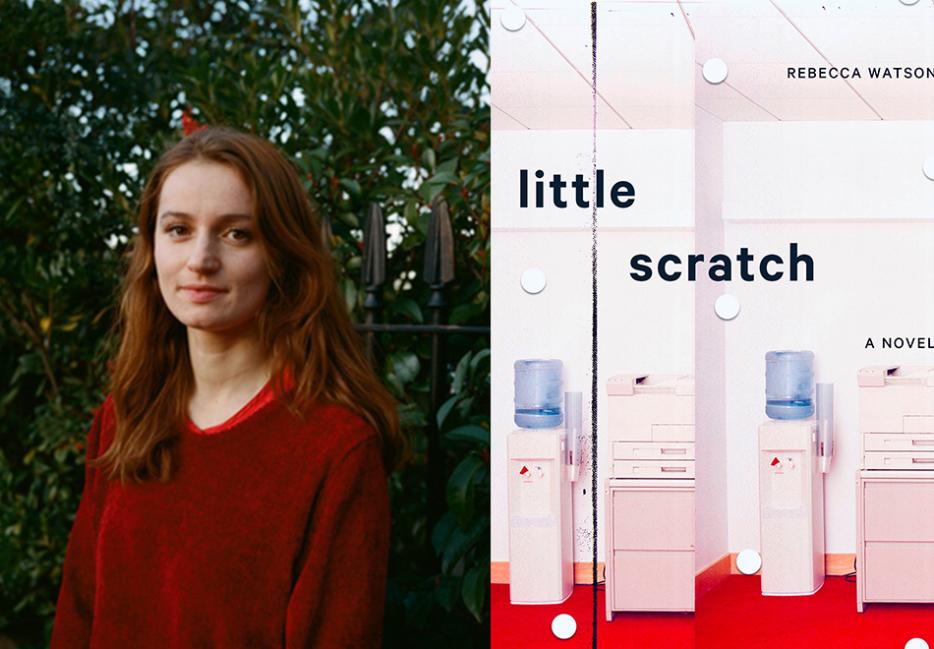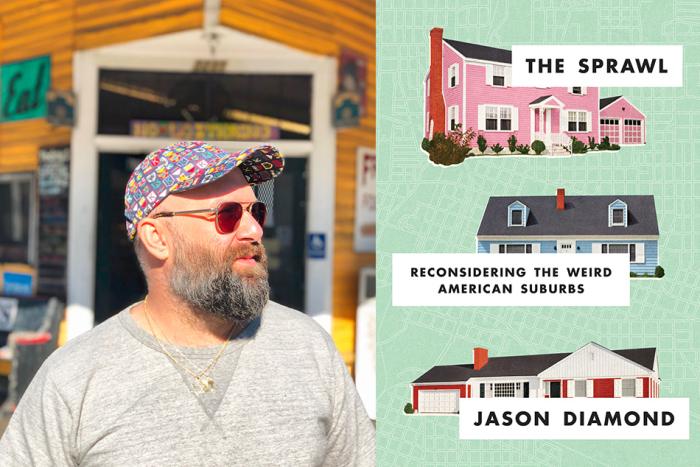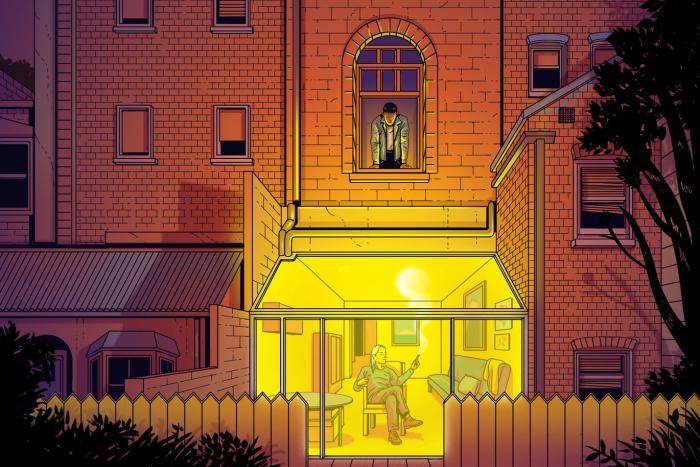I wanted to talk to Rebecca Watson about something other than sexual assault, I really did. The author, editor, and journalist, whose debut novel little scratch (Strange Light), was published earlier this month, clearly has a lot to say about many things: the novel form, modern office life, the anxiety of young creatives in the capitalist economy, those little cups of wine you get at poetry readings that are technically free but don’t feel free, because you are paying for them in minutes—hours—of your life spent listening to someone speak in short bursts about their anxiety as though no one has ever had it before, and also it is bad wine, relationships, transit, taking up space in public, women, men, social media, the death of the newspaper… little scratch engages deftly with all of these. But we mostly talked about sexual assault.
It can often feel like the only thing to talk about. Michaela Coel’s multi-part rape epic I May Destroy You recently took over the mediascape, reigniting a strain of cultural commentary, first-person essays, and bad-faith “debate” that has burned, at varying degrees but uninterrupted, since the #MeToo movement kicked off in earnest in October 2017. At a socially distanced gathering a few weeks ago, conversation turned, three drinks in, to what a friend called “the inevitable sexual assault chat,” as temporarily out of work comedians, artists, and theatre performers discussed what life would look like after COVID, and whether the New Normal might involve being asked to work with fewer rapists. On a personal level, I’ve been experimenting with calling something a sort-of boyfriend did to me several years ago “rape,” after seeing Michaela Coel’s character Arabella experience the same thing onscreen. I had written it off for years as a not-great evening with a not-great guy, but watching Arabella passionately call out the man—a fellow writer—who did it to her, it seemed so clear. “He is a rapist,” she says, to a room of his peers. “Not rape-adjacent, or a bit rapey. He’s a rapist.” Later she double-checks with two policewomen, who confirm. The unnamed narrator of Watson’s novel lays it out in similarly unequivocal terms: “rape = no consent.”
Still, rape is far from the only subject of little scratch, an experimental work chronicling every action (hungover commute, a mediocre soup lunch), feeling (disgust at “the dreaded desk,” the “WHOSE EYES ARE THESE” experience of coffee), and thought (“maybe tweet it?”) an unnamed female narrator experiences in a single day. That her boss sexually assaulted her is just one more thing to worry about, something to mull between WhatsApp messages, coworkers’ tedious demands, the question of her untended literary aspirations, and an increasingly urgent need to pick and scrape at the skin behind her knees. little scratch’s narrator is distracted, bored, horny, funny, traumatized, clever, tired, overworked, and absolutely seething with rage—at her boring job, at the inadequacy of language, at bad men and “good” ones too, and all the ways, overt and subtle, they make women feel small or endangered or disposable. (You can see how we ended up back at rape.)
This interview has been condensed and edited for clarity.
Monica Heisey: The book started as a short story, one that won the White Review Short Story prize. Did you always have plans to expand it into a novel, or did that come later?
Rebecca Watson: When I first started writing I didn't know what it was at all. It was just like, it kind of happened off the back of… something happened, and I just had this challenge in my head of wanting to write immediacy, so I started by writing a moment. And as I was writing, hyper-focused on the present, it started to feel like part of something bigger. So, I just kept extending it and extending it. And within a few thousand words I was quite clear that it was a book rather than just a passage or a thought exercise.
You definitely conveyed the immediacy that you were going for. There’s an aggressive simultaneity I found almost stressful to read. I don't know if you remember that Horse E-books tweet, "Everything happens so much," but little scratch kind of felt like that. What was the process of writing something where the plan is to include everything?
It was stressful for me as well! I began writing this book because I was at work on my lunch break, trying to write. And someone came up to me and did ask me what book I was reading at the moment. And I did have that moment of being like, "Fuck's sake, what are books? Have I ever read a book in my life?" So that kernel in the book is based on a real moment, one in which I became aware of so many different things that were going on, and how despite everything I was unable to think of anything. And it just clicked into my head, the desire of a writer to guide the reader from the beginning of the paragraph to the end, and wanting to be able to tell them so many different things at the same time and that being impossible. So that first thought as I was writing that moment up was just “How do I show the reader all these different things without having to make them wait?” I wanted to write everything that was going on at the same time in one moment. And I wrote that, then quite quickly after I was like, “Okay, I can do a moment of immediacy. Is it possible to write a full day of immediacy?”
And I found that I could, it started to become a book quite quickly, but there was part of me that didn't want to carry on, because if you keep going, there are points as a writer where you start wanting to skip—like, okay well, I now want to take it to this place but they actually walked to the places after, so can I skip this part, but [with the formal constraints of the book] I couldn't. And I started to run into more and more of those challenges where it was just like, Jesus Christ, how do I do this? But that was kind of the fun of it, the question of like, how do you write the stuff that generally you don't want to write? Or that you want to avoid, because it's always not easy to write? I say the fun of it, but it was really stressful, and I felt as I was writing that the reader was going to have to work. There were points where I felt like I was creating a game for the reader, because they have to kind of become the protagonist and inhabit the book themselves, and for some readers that's fun, and for some readers that will be maybe not what they want to do at all.
It was definitely a very active experience.
Did it… I will always find it interesting, to ask the reader... was there a set way that you read it? Did you read across? Did you kind of mix it up?
There were times where I had to sort of pick which part of the page I was going to devote my attention to first, then loop back to make sure that I had understood the order in which things were happening. The fact that there wasn't really an order and these things were just all happening at once was… disorienting! I kind of tackled the biggest chunks on each page first.
I love the word "tackle." [laughs]
I think my dumb little brain resisted at first, kept trying to squeeze what you’d written into a more conventionally novelistic reading experience. But once I relaxed into the form, I was reading a lot more freely, letting everything kind of wash over me. All that activity! It was a very different experience from what I've been up to in lockdown.
Yeah, I bet it was. [laughs]
While you were writing it, did you read other books set in—I'm thinking maybe of Mrs. Dalloway—set in that kind of relentless present?
Not really. I mean, Virginia Woolf is someone I was obsessed with—she was the person that first ignited, for me, some kind of excitement about how to play with words and ideas of prose and where it can go. I started reading her when I was sixteen, seventeen, at that moment when everything is so profound anyway, so she's someone who's definitely stayed with me, but I think when I was starting to write little scratch, I'd been reading about Javier Marías. He's a Spanish novelist, and he has this just insane grasp of sentences. The dialogue… there'll be a couple in a cafe, and a man talking to someone, and that bit of dialogue will take him across pages of digression until he takes you right back to where you started and you'll be back at that conversation. He really set me off when I was writing, because he is just in crazy control of the reader, and has this ability to mentally take you so far, but still reel you back in. I thought about him a lot, just for that control. But also, for the ability to travel like that, to take the reader ten pages away, and then snap them right back where he wants them.
The book’s setting and form were really striking choices for a sexual assault story. Because we hear literally everything that happens to the narrator that day, every thought in her head, the aftermath of her assault is just one other thing to deal with. Often, in TV or literature or Greek tragedy, rape is this turning point in women's lives—they’re ruined or kill themselves or go mad—but assault is a really commonplace experience that a lot of women just survive.
That was quite important to me. There wasn't a specific thing that I read or watched that frustrated me, it was just this recurring sense that rape was the climax of anything that you read or watch. Or the explanation, sometimes—if a woman was acting oddly then the answer was always rape, and I just found that not only boring, but inaccurate. I think I was really trying to talk about trauma and rape, but have it be totally incidental. I mean obviously, it ends up, in some ways, being the climax to this book as well, but I like the idea of it not following the same kind of linear structure you're usually taught to follow. And also, I don’t know, I don't often, like, hear about people in books and TV who've been raped who also have sex… it seems like something that’s hard for people to imagine.
I found that so interesting, the narrator’s insistence on her right to a continued, active sexuality, the time she spends delineating the difference between consensual, erotic sex, and what happened to her at the hands of her boss.
I feel like depictions of rape, it's always like, “Okay, well, they've been raped so therefore like they can't use their body in any other way now. That's the end of that.” And already sex and rape are confused so much. It was important for me that they existed in two different realms.
The book really avoids setting up one “bad” character, or presenting an angelic support source who understands everything. Really, every character in the narrator’s life lets her down in different ways. In particular she goes in on: “not just the bad men but the good ones, the slowing down, the opening WhatsApp to explain consent to men who I thought would get it, at least them, How! How are they not with me here! They don't even know, and they're already not with me.”
Yeah. Oh god. I kind of forget that that's in there, but hearing it again I relate instantly, I feel that feeling every day. It was important to me that [the narrator] was also, not complacent, but that she recognized that viewpoint even in herself. The whole book, this whole day with her is really her following a formula that she's expected to follow... of pushing down what's happened, ignoring it, thinking about what outfit it may have been, you know, exactly how those people would have reacted. And she's sort of going through those modes of argument herself, asking if she’d said something or done something or if it was her clothes, her ambitions, her way of being in the world. I didn't really want anyone to be particularly shiny or particularly awful, just everyone participating in the same structure and systems that repeat and repeat and repeat.
There are a number of scenes in your book where your narrator struggles to name what actually happened to her, even though she knows, really. I think that’s a very common situation, to call an assault “a bad date” or an abuser “a bit rapey.” I get the impulse to downgrade the experience, in a way—confronting how many things “rape” encompasses means confronting how incredibly common an experience rape is. What do you think about the language we have for describing assault?
My protagonist's struggle is being able to match her experience and the brutality of language, and the permanence of language. Like, you're making a decision when you’re using these words. There can be a sense of comfort in being hazy or ambiguous, compared to using the word "rape" or even describing the man as a "rapist" rather than "the man who raped me," which has this real brutality. I think it's important. The way we edge around language enables those experiences to remain ambiguous and for us to see them ambiguously and discuss them ambiguously. There's this thing called "rape," that’s this big, dramatic, “man on a dark street” thing on one hand and then everyday experiences that women and other people have had on the other. So you have rape and you have these experiences that are rape but that we don't call rape. And the term becomes grander and more theatrical as you continue to not categorize any of these things as rape.
I've been raped, and I think I didn't know that I'd been raped for a while, because I was just kind of like, this doesn't fit into a mold that I've been taught. It was very helpful for me to actually realize that it was rape. And all of these foggy and unclear feelings were able to actually sit in something that I did understand and could call something. With little scratch it was important that she said she'd been raped, but it was also important that it wasn't said as a climax... I think when she finally says she has been raped, she says, "I have been raped. Yes I know." And for her it’s—rather than something that is upsetting to her—it’s kind of acceptance. Using that language is a way of actually being able to say, yes, it fits into this category, and I can start taking it seriously, and sometimes you need that seriousness to accept it.
I sort of wanted to avoid the “how much of this is based on your own life” line of questioning, but I read an essay of yours in Elle UK where you wrote about an experience similar to the narrator’s, and I'd wondered how it felt to write something so immediate—so intimate, about a fictional situation you could, unfortunately, relate to quite closely.
Yeah, it was kind of a stupid thing to do in a way. Writing it was a very invasive experience. Not because I felt like I was writing my own life, but because I felt like I had someone else's life very close to me, and a lot of the writing felt like, this is someone’s life, it really was like her voice appearing and talking to me. I felt like I was really just listening to her and writing that down. So that was a very, very personal thing for me, and a very unique and intimate experience to have someone's head so close to mine, and sometimes I kind of feel like, is that me, just because she spent so much time in my head, you know, so to a degree she is me. As a writer creating something, it's like, where else does it come from apart from somewhere inside me?
As a female writer, particularly a young debut novelist, this book will be confused with me and will always be confused with me, regardless. Particularly writing first person immediacy, it's a work where the character feels very close to the reader, and you just connect that to the author. Which is something I was aware of even when I was writing—there are kind of like riffs on it in the book where, like, I'd write something and then be so aware that that would be read as me, I couldn't help but say something sly, or rebut within the text.
I loved the group chat going in on autofiction.
I can understand the instinct—you know, like the reading and writing experience is very intense. There's almost the confusion of reading something that feels real, and instantly there’s the urge to connect that to someone real. Which is not necessarily a bad thing to do, but it does happen to mostly women writers, which can be so patronizing. It’s just the reader being unable to believe that you actually have the capacity to create.
There are parallels in this book to my life, but I haven't lived any of this experience—the narrator’s experience of rape is very different to mine, and her experience of the working day is very different to mine, her relationship with her boyfriend is very different to mine. But I have, you know, worked a 9-to-5 job, I have been raped, I have a boyfriend, so sure, you can connect these facts to me.
What are you working on now?
Oh god. I'm writing my second novel. And it is quite a stressful process! I feel like I learned a lot about who I was as a writer from little scratch. But the problem is that I'm not about to write a second little scratch. Basically, I need to shove away everything that I've learned from writing this. Everything that I've assumed about what I want to be doing, because that was all just about that project. And what I'm trying to write now is quite different—formally, topically. little scratch started as an experiment and wanting to achieve something in terms of writing the present tense. And so, I kind of feel now, you know, as if I've kind of achieved what I wanted to achieve from that, which is a really good feeling. But it makes anything else very stressful.
Have you been able to read during the pandemic? A lot of people have been saying their attention spans are just shot, that there's—maybe ironically, for your novel—too much going on all at once for them to focus on reading.
Maybe little scratch gave me some practice. I’ve been reading, although what I've been reading has been very different to what I'd usually read. I've been reading a lot of Sarah Waters, people that are very plot-heavy and very quick-moving plot as well. I think I’ve essentially been looking for people that move at a quicker pace than I’ve been able to move these last few months, which was really effective, and I've been very grateful to be able to escape into those books. I definitely feel like I've needed reading more than ever at the moment.
I’ve been reading a lot of pop history stuff. Thinking a lot about the past.
A bad place, but a better place too.
It's just been nice to imagine times other than this one, to remember that people got through them and things moved forward. This moment feels so suspended in amber or something... the idea that progress is possible is a comfort.
I definitely feel that. Just remembering that moments are part of a pattern, right? Like they've happened before and they'll happen again. Which means we're going to get out of this one. Hopefully soon... although probably not.






